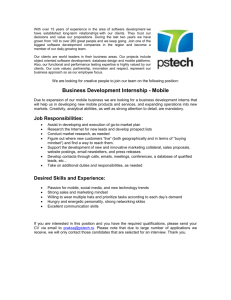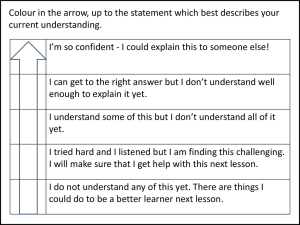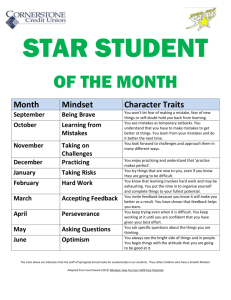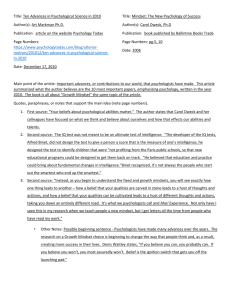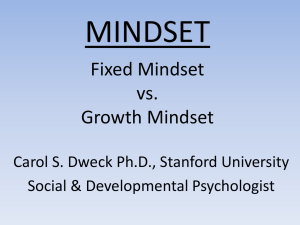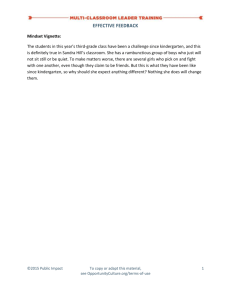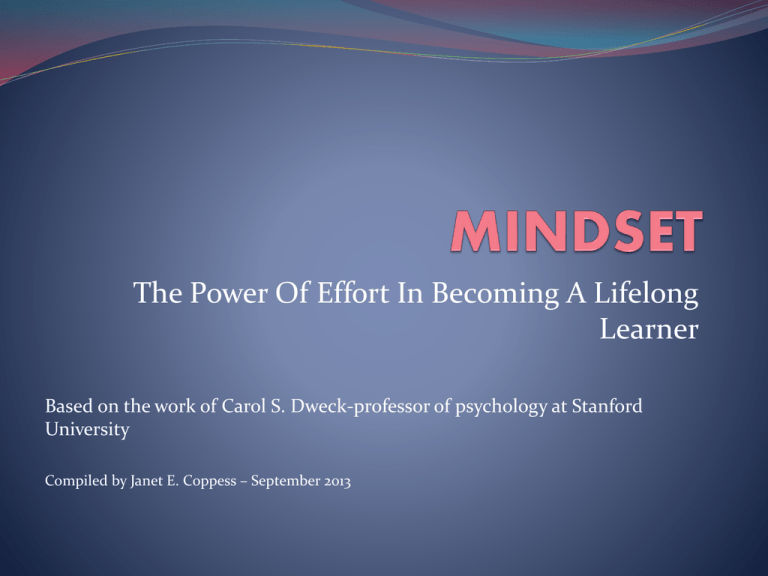
The Power Of Effort In Becoming A Lifelong
Learner
Based on the work of Carol S. Dweck-professor of psychology at Stanford
University
Compiled by Janet E. Coppess – September 2013
Intelligence
Intelligence was long believed to be fixed – the amount of intelligence
possessed at birth was the amount a person possessed until death.
Current brain research dispels the belief in “fixed” intelligence. Intelligence
increases or decreases over time depending on the environment
Intelligence is dependent on the interaction between genetic inheritance and
experiences provided by the environment. It is changeable.
“The brain, with its complex architecture and limitless potential, is a highly
plastic, constantly changing entity that is powerfully shaped by our experiences
in childhood and throughout life…”
“Giftedness may be developed and expressed to a moderate, high, or profound
level.”
“Studies indicate that we continue to grow in intelligence or show a loss of
intelligence as we develop depending on the environment with which we
interact, the intellectual challenges in which we engage, and on our personality
characteristics.”
Clark, Barbara. Growing Up Gifted. Pearson Prentice Hall, 2008.
Teaching About the Brain and
Mindset
The brain is like a muscle – the more you use it
the stronger it becomes-you can become smarter
Neurons (nerve cells) in the brain form new
connections (multiply and get stronger) when you
learn new things, resulting in a stronger, smarter
brain
You can influence your brain
You can get smarter no matter how old you are
with effort and work
Blackwell, L.S. (2002). Psychological mediators of student achievement during the transition to junior high
school: The role of implicit theories. (Doctoral Dissertation, Columbia University, 2002.) UMI #3048094
Mindset
There are two types of Mindset:
Fixed Mindset
Growth Mindset
• -Carol Dweck
The Fixed Mindset
Students with a fixed mindset believe in fixed intelligence
Students with a fixed mindset believe you must look smart
at all costs
Students with a fixed mindset lack confidence in
themselves
Students with a fixed mindset believe hard work proves a
lack of intelligence (true of many “gifted” students)
Students with a fixed mindset do not correct their mistakes
A fixed mindset limits intellectual growth.
The Growth Mindset
Students with a growth mindset believe their abilities and
intelligence can be developed
Students with a growth mindset want tasks that stretch their
abilities
Students with a growth mindset believe effort enhances their
abilities and intelligence –even geniuses have to work hard
Students with a growth mindset confronted their mistakes and
deficiencies and sought methods/strategies and new knowledge
to remedy them
Students with a growth mindset make learning their
major goal
What Is Your Mindset?
Fixed
1. Don’t make mistakes
2. Don’t work hard
3. If you make mistakes,
don’t try to repair
them
Growth
1. Take on challenges
2. Work hard
3. Confront your
deficiencies
(mistakes) and correct
them
Mindset Messages
Praise for :
Intelligence:
Effort:
Students adopt a fixed mindset
Students adopt a growth mindset
-reject challenge
-embrace challenge
-lose confidence when mistakes are -maintain confidence when mistakes
made
are made
-perform poorly
-perform far better (even on an IQ
test
Words to Encourage Growth
What did you struggle with today?
This is hard, this is fun, what should we do next?
You can grow your intelligence.
You can learn. You can stretch. You can keep mastering new things.
You’ll get there.
How many ways did you try it before it turned out the way you wanted it?
What do you plan to do next?
Are you pleased with what you did?
That looks like it took so much work!
That looks like it took a lot of effort.
How did you figure that out?
What opportunities for growth are available to me/you today?
Famous People with a Growth
Mindset
Mozart- practiced until his hands were deformed, it took him ten years to
produce any quality work we recognize today
Einstein – his teachers felt he was subnormal
Bruce Jenner –” …the way you get ahead in life is hard work.” (1976 Olympic
Gold Medalist in the decathlon)
Babe Ruth -practiced daily
Abraham Lincoln – lost several elections, kept trying.
Chuck Yeager – elite military pilot – “The best pilots fly more
than the others; that’s why they’re the best.” (Hero of The Right
Stuff)
Grow Your Brain Neurons
You have BILLIONS of neurons!
You can grow more all the time!
Healthy CHOICES grow healthy BRAINS!
Recipe for Growing Your
Brain
Eat
Drink
Sleep
Exercise
-Nuts
-Fish
-Fruits
-Vegetables
-Whole grains
-Water
-9-10 hours every night
-Every day
Limit
-Pop
-Sugar
-Chips
-Junk Food
Calm Brains Learn!
Use Your Strategies:
-Square breathing
-Visualization
-Positive Self-Talk (I can do this, I practiced, More practice will get
me there, etc.)
-Avoid Fight or Flight Syndrome – (You fight or run!)
Square Breathing
1. Take a deep breath, breathing in for four seconds.
2. Hold your breath for four seconds.
3. Slowly exhale for four seconds.
4. Do nothing for four seconds and then repeat the steps.
When should I use this technique?
Before taking a test
In a stressful situation
When someone gets in your face
In any unfamiliar situation where you feel uncomfortable
B.R.A.I.N
YOUR STRATEGY FOR ANY BIG PROBLEM:
B. REAK IT DOWN
R.EPEAT
A. CTION
I.NFORMATION SEARCH
N.EVER GIVE UP!
GROWTH MINDSET PLEDGE
We pledge to:
Get excited about challenges. We say Yea!
Keep trying, even when it gets hard.
Listen carefully when people are trying to help us.
Cheer for each other when we work hard!
Remember that everyone has to practice if they want to learn.
Mindset Works.com
Main Idea
“It matters greatly what students believe
about their intelligence.”
“…when teachers believe in fixed
intelligence, this is exactly what happens. It
is a self-fulfilling prophecy.”
-Carol Dweck
“Boosting Achievement with Messages that Motivate.” – Carol Dweck.

